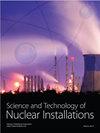Stress and Strain State Analysis of Crack Front in Dissimilar Metal Welded Joints with Dual Field of Mechanical Heterogeneity and Residual Stress
IF 1
4区 工程技术
Q3 NUCLEAR SCIENCE & TECHNOLOGY
引用次数: 0
Abstract
The micro-mechanical state at the crack front is one of the key factors affecting the stress corrosion cracking (SCC) growth behavior. The mechanical heterogeneity and residual stress in the dissimilar metal welded joint (DMWJ) induce the micro-mechanical state at the crack front to become more complex. The sandwich model and dual-field model of the DMWJ with inner surface axial crack were established in this study. The stress and strain states at the crack front with different crack locations and lengths under the interaction of the mechanical property and the residual stress were investigated. The results show that a more accurate evaluation of stress and strain states can be obtained when using the dual-field model to describe the material mechanical property and residual stress of the DMWJ. The sandwich model overestimates the crack driving force including the stress and strain at the crack front. The tensile stress in the middle of shallow cracks is smaller than that at both ends, while the tensile stress in the middle of deep crack is larger than that at both ends. The variation trend of the tensile stress and normal strain at the crack apex is basically the same as that of the residual stress with the crack depth. However, there is almost no normal plastic strain in the initial stage of crack propagation due to the small residual stress in the initial stage.具有机械不均匀性和残余应力双重场的异种金属焊接接头裂纹前沿应力应变状态分析
裂纹前沿的微观力学状态是影响应力腐蚀开裂(SCC)扩展行为的关键因素之一。异种金属焊接接头(DMWJ)中的机械不均匀性和残余应力导致裂纹前沿的微观力学状态变得更加复杂。建立了具有内表面轴向裂纹的DMWJ的夹层模型和双场模型。研究了在力学性能和残余应力相互作用下,不同裂纹位置和长度的裂纹前沿的应力和应变状态。结果表明,当使用双场模型来描述DMWJ的材料力学性能和残余应力时,可以获得更准确的应力和应变状态评估。夹层模型高估了裂纹驱动力,包括裂纹前沿的应力和应变。浅裂纹中部的拉应力小于两端,深裂纹中部的拉伸应力大于两端。裂纹尖端的拉应力和法向应变随裂纹深度的变化趋势与残余应力的变化趋势基本相同。然而,由于初始阶段的残余应力较小,在裂纹扩展的初始阶段几乎没有正常的塑性应变。
本文章由计算机程序翻译,如有差异,请以英文原文为准。
求助全文
约1分钟内获得全文
求助全文
来源期刊

Science and Technology of Nuclear Installations
NUCLEAR SCIENCE & TECHNOLOGY-
CiteScore
2.30
自引率
9.10%
发文量
51
审稿时长
4-8 weeks
期刊介绍:
Science and Technology of Nuclear Installations is an international scientific journal that aims to make available knowledge on issues related to the nuclear industry and to promote development in the area of nuclear sciences and technologies. The endeavor associated with the establishment and the growth of the journal is expected to lend support to the renaissance of nuclear technology in the world and especially in those countries where nuclear programs have not yet been developed.
 求助内容:
求助内容: 应助结果提醒方式:
应助结果提醒方式:


